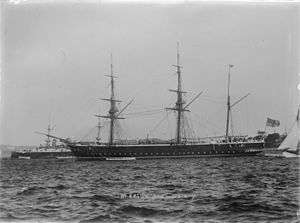HMS Opal (1875)
HMS Opal was an Emerald-class corvette of the Royal Navy, laid down as Magicienne by William Doxford & Sons Ltd, Sunderland and launched on 9 March 1875.[2]
 Opal in Sydney | |
| History | |
|---|---|
| Name: | HMS Opal |
| Builder: | William Doxford & Sons Ltd, Sunderland |
| Laid down: | 13 October 1873 |
| Launched: | 9 March 1875 |
| Fate: | Sold for breaking at Sheerness, August 1892 |
| General characteristics [1] | |
| Class and type: | Emerald-class corvette |
| Displacement: | 2,120 tons |
| Tons burthen: | 1,864 bm |
| Length: | 220 ft (67 m) pp |
| Beam: | 40 ft (12 m) |
| Draught: |
|
| Depth of hold: | 21 ft 6 in (6.55 m) |
| Installed power: |
|
| Propulsion: |
|
| Sail plan: | Full-rigged ship (barque from the 1880s) |
| Complement: | 232 |
| Armament: |
|
She was completed with an armament of 14 muzzle-loading 64-pounder rifled guns (2 as bow and stern chasers mounted on centre-line swivelling slides, and 12 on broadside slide mountings) and initially commenced service on the Pacific Station, and while on passage in 1876 hit a rock in the Strait of Magellan. She was damaged and repairs were undertaken at Esquimalt.[2] She returned to England in 1880 for refit, in which her broadside armament was reduced by 2 guns and she was re-rigged as a barque.[2]
She sailed for service on the Cape of Good Hope and West Africa Station in 1883.[2] En route she arrived at Limbe, Cameroon on 19 July 1884, she was carrying the British Consul for the Bights of Benin and Biafra, Edward Hyde Hewett on his mission to claim the Victoria area (the Cameroon) for Britain. He arrived and planted his flag too late, as Gustav Nachtigal had already raised the German flag at Douala a few days earlier on 14 July 1884.[3]
She then commenced service on the Australia Station in 1885. She returned to England in 1890 and was placed into reserve. She was sold for breaking up at Sheerness in August 1892.[2]
Citations
- Winfield (2004), p. 288
- Bastock, p. 87.
- Ndi, Anthony (2014). Southern West Cameroon Revisited Volume Two: North-South West Nexus 1858–1972. Langaa RPCIG. p. 100. ISBN 9956-791-32-6. Retrieved 11 February 2019.
References
- Bastock, John (1988), Ships on the Australia Station, Child & Associates Publishing Pty Ltd; Frenchs Forest, Australia. ISBN 0-86777-348-0
- Winfield, R.; Lyon, D. (2004). The Sail and Steam Navy List: All the Ships of the Royal Navy 1815–1889. London: Chatham Publishing. ISBN 978-1-86176-032-6.
| Wikimedia Commons has media related to HMS Opal (ship, 1875). |